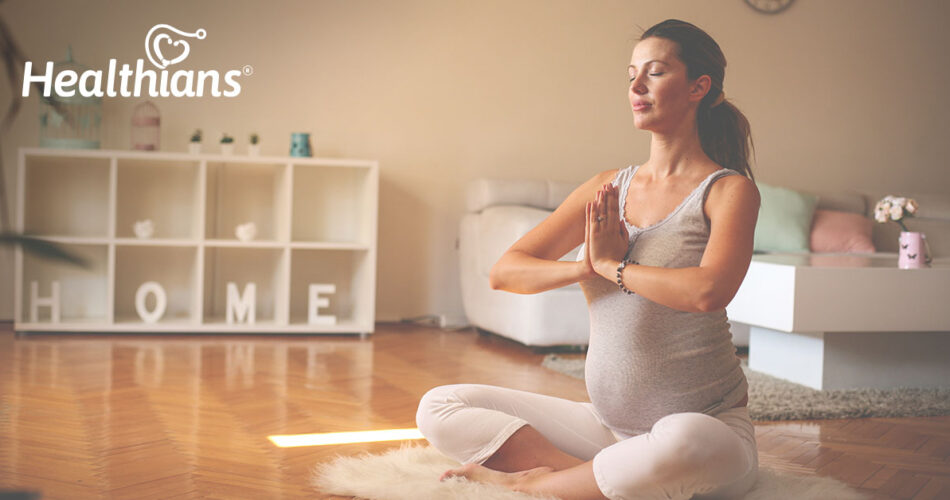Introduction
Yoga is an old-age, conventional type of exercise that not only increases stamina and endurance but also improves the quality of life in general. The asanas incorporated in yoga are designed to promote relaxation and tranquilly as well as mental and physical health.
The most wonderful and joyful time in a woman’s life is her pregnancy and for having a healthy pregnancy yoga is a must. But for the majority of women who experience the nine months of hormonal shifts, mood swings, enduring nausea, exhaustion, breathing issues, and incapacitating leg cramps yoga is a miracle. Yoga asanas, offer a spiritual and natural route to a healthy body and calm mind, making exercise and keeping active highly necessary even during pregnancy to soothe the body and prevent difficulties.
A mom-to-be can be greatly benefited from the various yoga asanas because they help in maintaining bone density, tone muscles for improved blood circulation, relax the nervous system, balances the body, keep the skin supple, reduces tension, and get the body ready for labour and delivery.
5 powerful yoga poses during pregnancy
Marjariasana (Cat Pose/Cow Pose)
Kneel while maintaining a straight back. Inhale deeply, elevate your chin, and slightly tilt back your head. Hold the position with tight buttocks for 30 seconds or as long as it feels comfortable while inhaling deeply. Exhale and tuck your chin into your chest. Your back should be arched as pleasantly as possible. Relax your buttocks. Repeat the position three more times after holding for a while.
Benefit: During the third trimester, this is most advantageous. It increases blood flow, extends the shoulders and back, and makes the spine more flexible.

Bhadrasana (Butterfly pose)
Sit in the butterfly position, or bhadrasana (Refer to the below image). Stretch your legs out completely. Form the gesture of ‘Namaskar’ with your feet, touching each other. Sit straight, without leaning forward.
Keep your back straight while you are sitting. Put your hands on your ankle or knees. Once you are comfortable, hold the position for a while. Legs should be straight, followed by a minute of relaxation.
Benefits: It helps in strengthening the pelvic area, increasing groin and hip flexibility, stretching the thighs and knees, and easing discomfort.

Parvatasana (Mountain pose)
In Parvatasana (Mountain Pose), you should sit upright and breathe deeply. Raise your arms in the ‘Namaskar’ pose, joining your palms together. Elbows should remain straight. Put your hands in close proximity to your ears. Hold the position for a little while before returning to your regular position. Do this atleast 3 to 5 times.
Benefits: It includes better posture, relief from neck and back discomfort, and an improvement in hip flexibility.

Trikonasana (Triangle pose)
Stand upright in the ‘Trikonasana’ (Triangle pose), keeping your feet together. Your hands should be at your sides. Spread your legs apart gradually. Raise your right hand, breathe deeply, bend to the left, and maintain balance by placing your left hand on the ground. Count to 20 while tilting your head forward and focusing on your right hand’s fingertips. Now repeat the same by bending to your right and maintain your stance by placing your left hand on the ground. After one minute of relaxation, repeat the complete position twice more.
Benefits: It lessens back discomfort and tension, boosts hip flexibility, and helps with digestion during pregnancy.

Shavasana (Corpse pose)
Close your eyes while you lay on your back. Rest your body and mind to calmness. and contemplate joyful, calm ideas. While doing this, take your time. Don’t hold your breath; just breathe normally. Wait a while, then get up.
Benefits: This pose should be done at the end of your yoga practice to cool the body and calm the mind. You can also do this after each asana to your body unwind between poses.

Final thoughts
Pregnant women experience a lot of physical discomforts, therefore yoga promotes flexibility, mental clarity, and focused breathing to ease this. Yoga during pregnancy is good for the mothers and their unborn children are also benefitted.
Meditation techniques like ‘Swaas Dhyan’ and ’Siddhohum Kriya’ can be incorporated into your regular practice. ‘Brahmari Pranayama’ and ‘Anulom Vilom’ are two more yoga breathing methods that can support your overall wellness when you’re pregnant.
Although getting a medical opinion before beginning pre-pregnancy yoga is strongly recommended in order to understand which yoga asana to practise throughout the specific stage of pregnancy, yoga is very helpful for the full nine months and essential for both the mother and baby.
To avoid issues and have a healthy, happy pregnancy, it is also essential to learn the proper asanas from a certified yoga instructor.




